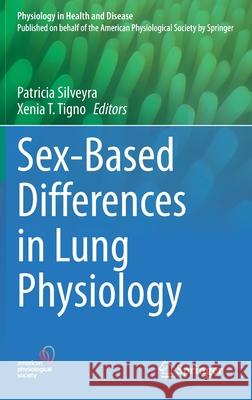Sex-Based Differences in Lung Physiology » książka



Sex-Based Differences in Lung Physiology
ISBN-13: 9783030635480 / Angielski / Twarda / 2021 / 490 str.
Sex-Based Differences in Lung Physiology
ISBN-13: 9783030635480 / Angielski / Twarda / 2021 / 490 str.
(netto: 651,74 VAT: 5%)
Najniższa cena z 30 dni: 655,41
ok. 16-18 dni roboczych.
Darmowa dostawa!
1- Sex differences in respiratory physiology – V. Sathish
2- Sex steroids and their influence in lung disease across the lifespan – F. Gomez Real
3- Neonatal lung disease: mechanisms driving sex differences – K. Lingappan
4- Sex differences in the pediatric lung: implications for lung disease – E. Arteaga-Solis
5- Lung diseases affecting women: genetic, anatomical, and physiological influences. – M. Hardin
6- Lung diseases affecting men: genetic, anatomical, and physiological influences. – R Jain
7- Sex differences in susceptibility to rare lung diseases – C. McCarthy
8- Relationships between respiratory and the male vs. female endocrine systems – M. Lencu
9- The lungs and the environment: sex differences in susceptibility to environmental exposures. – P. Silveyra
10- Sex specific effects of tobacco exposure – S. McKee
11- Sex differences in chronic obstructive pulmonary disease - D. DeMeo
12- Sex differences in lung innate immunity: implications for host responses – N. Heller
13- Sex specific lung adaptive immunity in chronic lung disease – D. Newcomb
14- Sex differences in airway remodeling – M. Stampfli
15- Sex differences in respiratory infection – S. Klein
16- The lung microgenderome – A. Morris
17- Sex differences in smoke inhalation lung injury – R. Maile
18- Lung cancer in men and women: physiological aspects – C. Dressler
19- Sex-specific effects in pulmonary vascular disease – T. Lahm
20- Sex differences in pulmonary arterial hypertension – S. Erzurum
21- Systems biology approaches to understand sex differences in lung disease – A. Arnold
22- Sex differences in circadian and sleep biology: influences on lung health – F. Duffy
23- Sex-specific lung disease therapeutics: are we there yet? – P. Silveyra
Dr. Patricia Silveyra is a Distinguished Associate Professor, Director of the Biobehavioral Laboratory, and member of the Center for Environmental Medicine, Asthma, and Lung Biology (CEMALB) at the University of North Carolina at Chapel Hill. Her research interests are on sex and gender differences in inflammatory lung disease. She specifically studies mechanisms by which sex hormones control inflammatory responses in the lung using mouse and cell models. Dr. Silveyra has published over 50 scientific articles in peer-reviewed journals. She has served as principal investigator, co-principal investigator, and co-investigator on University-, foundation- and NIH-funded grants. She is a former scholar of the NICHD K12, Building Interdisciplinary Research Careers in Women’s Health (BIRCWH), and the NHLBI Programs to Increase Diversity Among Individuals Engaged in Health-Related Research (PRIDE). Dr. Silveyra was born and raised in Argentina, where she earned her bachelor’s and master’s degrees in Molecular Biology and Biotechnology, and her PhD in Biochemistry, from the University of Buenos Aires. She moved to the United States as postdoctoral fellow and Rotary Ambassadorial Scholar. Dr. Silveyra is a member and co-chair of the National Academies of Sciences, Engineering and Medicine (NASEM) “New Voices” program, and a member of the NASEM Board on Higher Education and Workforce.
Dr. Xenia T. Tigno is the Associate Director for Careers at the Office of Research on Women’s Health, National Institutes of Health, Bethesda, MD. Prior to her current position, she was a Program Officer at the National Heart, Lung, and Blood Institute of the NIH and of the National Institute for Nursing Research. Dr. Tigno has published in the areas of the biophysics of the microcirculation, obesity, diabetes, aging, community-based epidemiology, chaos analysis, herbal medicine, and women’s health. She taught medical physiology for nearly 30 years, including serving as Professor and Chair of the Department of Physiology, University of the Philippines College of Medicine, and coordinator of the Medical Physiology course at the University of South Florida. A native of Manila, Philippines, Dr. Tigno obtained her Bachelor’s degree in Physics, and Master’s degrees in both Physiology and Epidemiology from the University of the Philippines, and her Doctorate in Natural Science degree from the University of Wurzburg, Federal Republic of Germany. As a bench scientist, she has worked in various laboratories, including at the CERN (European Organization for Nuclear Research) in Geneva, at the Physiological Institutes in Wurzburg, Munich, and Berlin, and at the National Cardiovascular Institute in Osaka. She has previously edited a textbook on Integrative Physiology. Dr. Tigno’s current efforts are directed towards supporting the advancement of women in biomedical careers, and promoting diversity and inclusion in academia.
This book provides an overview of the latest experimental work on sex-based differences in lung function and inflammation. Readers will learn how these differences relate to individual predispositions for the development of lung disease in men and women, and in different stages of their reproductive lives. Further, the book focuses on diseases that predominantly affect women or men, with an emphasis on the physiological mechanisms underlying their pathobiology.
In turn, these findings are complemented by chapters on recent studies, which investigate how circulating sex hormone levels impact the lung’s innate immune response to environmental agents and air pollution. The pathogeneses of asthma and viral respiratory infection are also major focus areas. As an outlook, the book also discusses current and future research directions aimed at developing sex-specific therapies for lung disease.
To examine these anatomical and physiological differences in the male and female respiratory systems, the authors employ a broad range of methods from molecular and clinical biology. Accordingly, the book will be a fascinating read for physiologists and clinicians alike.1997-2026 DolnySlask.com Agencja Internetowa
KrainaKsiazek.PL - Księgarnia Internetowa









